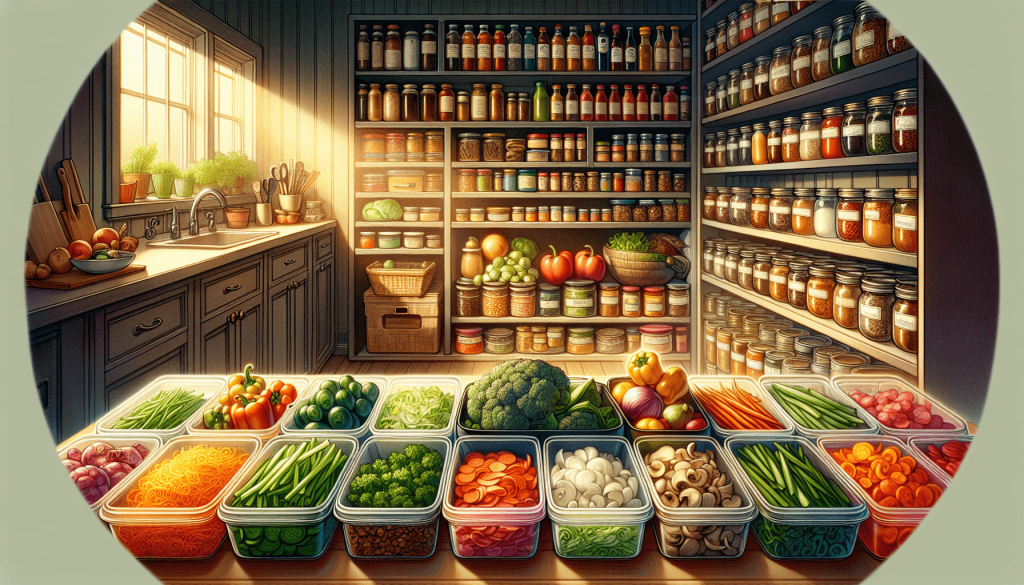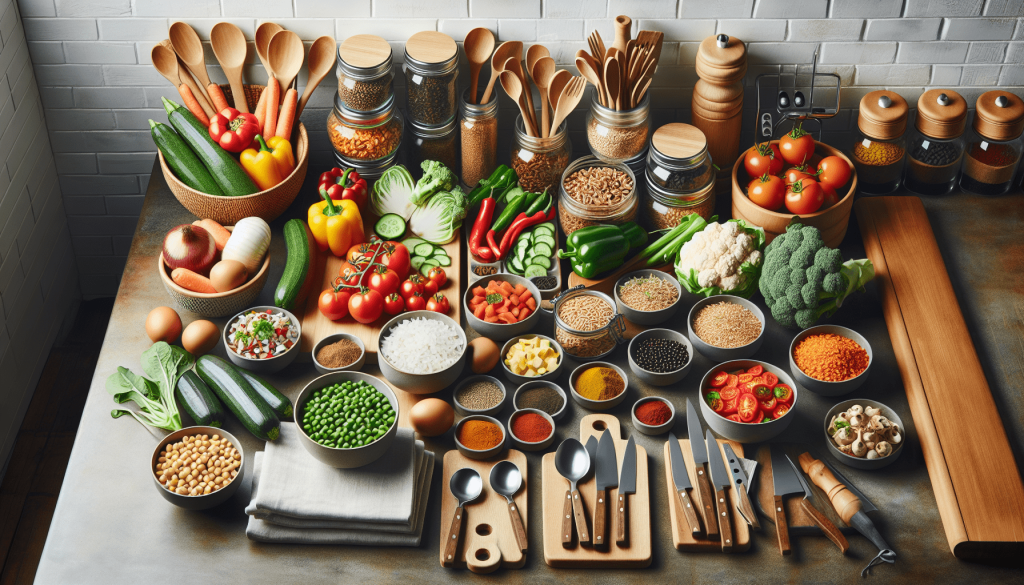Are you constantly struggling to find time to cook healthy meals during the week? Look no further! In this article, you will discover the best cooking tips for meal prep that will save you time, money, and stress in the kitchen. From prepping ingredients in advance to using time-saving kitchen gadgets, we’ve got you covered. Get ready to revolutionize your meal prep routine and enjoy delicious homemade meals, even on your busiest days.
Plan Ahead
Create a Meal Plan
Planning your meals in advance is a key aspect of successful meal prep. Take some time each week to sit down and create a meal plan for the upcoming days. Consider your schedule, dietary goals, and any special occasions or events that may impact your meals. By having a clear plan, you can ensure that you have all the necessary ingredients and avoid any last-minute stress or unhealthy choices.
Make a Detailed Shopping List
Once you have your meal plan, it’s time to make a detailed shopping list. Go through each recipe and write down all the ingredients you will need. This will not only save you time at the grocery store but also prevent you from forgetting anything. Having a well-organized list will make your shopping experience much smoother and more efficient.
Prep Ingredients in Advance
To save time during the week, consider prepping your ingredients in advance. This can include chopping vegetables, marinating meat, or cooking staple ingredients such as rice or pasta. By doing this, you can significantly cut down on your cooking time and have everything ready to go when it’s time to prepare your meals. Plus, it’s satisfying to see all your ingredients neatly organized and ready to use!
Choose Recipes Wisely
Opt for Simple Recipes
When it comes to meal prep, simplicity is key. Choose recipes that are easy to prepare and require minimal ingredients. This will not only save you time but also make the cooking process more enjoyable. Look for recipes with straightforward instructions and basic techniques. Remember, meal prep is about efficiency and convenience, so don’t feel pressured to create complex gourmet dishes.
Pick Meals That Can Be Easily Reheated
One of the main benefits of meal prep is that it allows you to have delicious, homemade meals throughout the week without constantly having to cook. Therefore, it’s important to choose meals that can be easily reheated. Consider dishes like casseroles, soups, or stir-fries that retain their flavor and texture when reheated. This way, you can have a hot and nutritious meal ready in just a few minutes.
Consider Dishes That Can Be Repurposed
To add variety to your meals and prevent food waste, consider choosing recipes that can be repurposed into different dishes. For example, if you’re making roasted chicken for one meal, you can use the leftovers to make chicken salad for another meal. This not only saves you time but also allows you to get creative in the kitchen and transform simple ingredients into new and exciting dishes.

Stock Up on Essentials
Invest in Good Quality Storage Containers
Having high-quality storage containers is essential for successful meal prep. Look for containers that are durable, airtight, and microwave-safe. This will help keep your food fresh and prevent any leakage or spills. Investing in a variety of sizes will also allow you to portion your meals correctly and store them conveniently in your fridge or freezer.
Have a Variety of Spices and Seasonings
Spices and seasonings are the secret to elevating the flavor of your meals. Stock up on a variety of spices such as salt, pepper, garlic powder, paprika, and oregano. Experiment with different combinations to keep your taste buds excited. Having a well-stocked spice cabinet will ensure that your meals are always delicious and packed with flavor.
Keep a Stock of Staple Ingredients
Staple ingredients are the building blocks of many recipes. Make sure you always have a stock of pantry staples such as rice, pasta, canned beans, and dried herbs. These ingredients have a long shelf life, allowing you to whip up a quick and satisfying meal even if you haven’t had time to go grocery shopping. Having a well-stocked pantry ensures that you’re always prepared to cook a nutritious meal.
Organize Your Kitchen
Keep Your Pantry Well-Stocked
An organized pantry is crucial for efficient meal prep. Keep your pantry clean and tidy, and regularly take inventory of your ingredients. Group similar items together, such as grains, canned goods, and snacks. This will make it easier for you to find what you need and prevent any unnecessary last-minute trips to the grocery store.
Arrange Your Fridge for Easy Access
When it comes to meal prep, a well-organized fridge is essential. Arrange your fridge in a way that allows easy access to your prepped ingredients and meals. Use clear containers or labels to identify different items and promote visibility. Place the most perishable items at eye level to ensure they are used first. By keeping your fridge organized, you can maximize the lifespan of your prepped meals and minimize food waste.
Label and Date Your Prepped Ingredients
To avoid confusion and keep track of freshness, it’s important to label and date your prepped ingredients. Use sticky labels or masking tape to clearly mark the contents and the date they were prepared. This way, you can easily identify what needs to be used first and prevent any unpleasant surprises when it comes to the quality or safety of your food.

Prep in Batches
Dedicate a Specific Day for Meal Prep
To make meal prep a seamless part of your routine, dedicate a specific day or time each week for prepping your meals. Choose a day when you have the most free time and can focus solely on cooking. Having a dedicated meal prep day not only saves you time during the week but also helps you stay organized and committed to your healthy eating goals.
Chop Vegetables and Store Them Separately
Chopping vegetables is a time-consuming task that you can easily tackle during your meal prep session. Take some time to wash, peel, and chop your vegetables, and store them separately in airtight containers or zip-top bags. This way, they’ll stay fresh longer and be ready to use whenever you need them. Having pre-chopped vegetables on hand will significantly reduce your cooking time and make it easier to incorporate them into your meals.
Cook Staple Ingredients in Bulk
To save even more time, consider cooking staple ingredients such as rice, quinoa, or beans in bulk. These can be easily stored in the fridge or freezer and used as the base for different meals throughout the week. Having these pre-cooked ingredients on hand will cut down on your cooking time and allow you to assemble meals quickly and effortlessly.
Utilize Time-Saving Techniques
Use a Slow Cooker or Instant Pot
Slow cookers and instant pots are a meal prepper’s best friends. These kitchen appliances allow you to set and forget, as they do all the work for you. Whether it’s cooking a batch of soup, stew, or a piece of tender meat, these devices save you time and effort in the kitchen. You can simply set the timer, go about your day, and come home to a delicious and perfectly cooked meal.
Opt for One-Pot or Sheet Pan Meals
Another time-saving technique is to opt for one-pot or sheet pan meals. These recipes require minimal cleanup, as all the ingredients are cooked together in one pot or on a single sheet pan. Not only does this reduce the number of dishes you have to wash, but it also saves you time on meal prep and cooking. Plus, the flavors of the ingredients meld together, resulting in a delicious and cohesive meal.
Try Freezer-Friendly Meals
Freezer-friendly meals are a game-changer for meal prepping. These are meals that can be cooked in advance, portioned out, and stored in the freezer for later use. When you’re short on time or simply don’t feel like cooking, you can simply grab a meal from the freezer, reheat it, and enjoy a homemade dinner without the hassle. Soups, casseroles, and stews are great options for freezer-friendly meals.
Use Proper Storage Techniques
Store Cooked Food in Airtight Containers
After you’ve prepared your meals, it’s important to store them properly to maintain their freshness and taste. Invest in good quality, airtight containers that can keep your food well-sealed and prevent any odors or flavors from transferring. Make sure to cool the food to room temperature before storing it, and always refrigerate or freeze perishable items promptly to extend their shelf life.
Label and Date Your Meals
To avoid any confusion or waste, it’s crucial to label and date your meals. Use sticky labels or a marker to clearly mark the contents, as well as the date they were prepared. This will help you keep track of how long each meal has been stored and prioritize which items to consume first. It’s also a good idea to rotate the items in your fridge or freezer to ensure nothing gets forgotten or spoils.
Utilize Freezer Bags for Long-Term Storage
For longer-term storage, consider utilizing freezer bags. These bags are designed to withstand freezing temperatures and can reduce the space needed in your freezer. Portion out your meals into the bags, remove any excess air, and seal them tightly. Make sure to label the bags with the contents and date. Freezer bags are especially useful for storing sauces, soups, and individual portions.
Practice Safe Food Handling
Wash Your Hands Before and After Handling Food
Food safety is paramount when it comes to meal prep. Always remember to wash your hands thoroughly with soap and warm water before and after handling food. This simple step helps prevent the spread of harmful bacteria and ensures that you’re starting with clean hands while handling ingredients that will be consumed later. Proper hand hygiene is essential for maintaining food safety throughout the meal prep process.
Avoid Cross-Contamination
Cross-contamination occurs when bacteria from one food item spreads to another, potentially leading to foodborne illnesses. To prevent cross-contamination, be mindful of keeping raw meats, poultry, fish, and eggs separate from other foods. Use separate cutting boards, utensils, and containers to avoid any contact between raw and ready-to-eat foods. Clean and sanitize your kitchen surfaces and tools thoroughly after handling raw ingredients to remove any traces of bacteria.
Cook Food to Appropriate Temperatures
To ensure that your meals are safe to eat, it’s important to cook food to appropriate temperatures. Invest in a food thermometer and use it to check the internal temperature of meat, poultry, and fish. Different types of meat have different safe cooking temperatures, so it’s essential to follow recipes and guidelines to ensure that harmful bacteria are destroyed. Avoid undercooking or overcooking your food by relying on an accurate thermometer.
Consider Portion Sizes
Divide Meals into Individual Servings
Portion control is an important aspect of meal prep, especially if you’re watching your calorie intake or working towards specific dietary goals. Once your meals are prepared, divide them into individual servings. This not only helps you stay on track with your eating habits but also makes it more convenient to grab and go when you’re ready to eat. Portioned meals also help prevent overeating and promote a balanced diet.
Use Portion Control Tools or Scales
If you’re concerned about accurately portioning your meals, consider using portion control tools or kitchen scales. Measuring cups, food scales, and portion control containers can help you ensure that you’re consuming the right amount of each food group. These tools can be particularly helpful if you’re following a specific diet plan or tracking your calorie intake. They provide a visual reference and take the guesswork out of portion sizes.
Adjust Portion Sizes Based on Dietary Goals
When planning and preparing your meals, it’s important to consider your dietary goals. If you’re aiming to lose weight, you may want to reduce portion sizes slightly or opt for lower-calorie ingredients. On the other hand, if your goal is to gain muscle or increase your calorie intake, you may need to adjust portion sizes accordingly. It’s essential to listen to your body and make choices that align with your specific needs and goals.
Be Creative with Leftovers
Transform Leftover Protein into New Dishes
Leftovers are a treasure trove of potential new meals. Instead of letting them go to waste, get creative and transform them into new dishes. For example, leftover roasted chicken can be shredded and turned into a flavorful chicken salad or used as a topping for a homemade pizza. Leftover grilled steak can be sliced and added to a refreshing summer salad. By using your imagination, you can breathe new life into your meals and prevent food boredom.
Repurpose Roasted Vegetables into Salads
Roasted vegetables are not only delicious but also incredibly versatile. If you have leftover roasted vegetables from a previous meal, repurpose them into salads or grain bowls. Simply combine them with your favorite greens, grains, and proteins for a complete and satisfying meal. You can also blend leftover roasted vegetables into soups or sauces for added flavor and nutrition.
Create New Meals Using Different Combinations
Don’t be afraid to mix and match different ingredients to create new and exciting meals. Experiment with flavors and textures by combining ingredients in unique ways. For example, you can use leftover cooked quinoa as a base for a protein-packed breakfast bowl, topped with fruits, nuts, and yogurt. Mix leftover roasted potatoes with sautéed vegetables and spices for a flavorful hash. The possibilities are endless when it comes to creating new meals using different combinations of ingredients.
In conclusion, meal prep is a fantastic way to save time, stay organized, and maintain a healthy eating routine. By following these tips, you can plan ahead, choose recipes wisely, stock up on essentials, organize your kitchen, and utilize time-saving techniques to make your meal prep experience efficient and enjoyable. Remember to practice safe food handling, consider portion sizes, and get creative with leftovers to keep your meals exciting and satisfying. With a bit of preparation and creativity, meal prep can become a regular part of your lifestyle, helping you achieve your health and wellness goals while enjoying delicious homemade meals.
